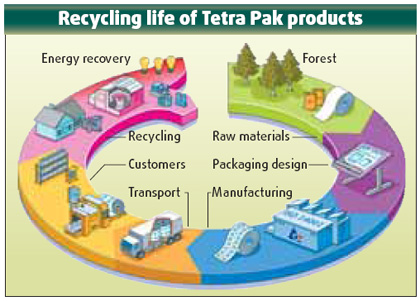

|
Sweden-based food packaging company Tetra Pak supports Forest Stewardship Council certification worldwide for environmentally friendly tree farms. File photo |
What Korsnas in northern Sweden and Yong'an in southern China's Fujian province have in common is tree farms seeking certification from the international Forest Stewardship Council (FSC).
Tetra Pak, a leading food processing and packaging solutions company, linked the two sites to support efforts by operators of the two tree farms to earn certificates in responsible forestry management.
Korsnas is one of Tetra Pak's 13 suppliers worldwide. The 13 suppliers deliver 2 million tons of paperboard each year to the packaging giant.
Tetra Pak said the Yong'an project promotes environmentally friendly management of forest resources in China.
The FSC is an independent non-profit organization that sets industry standards based on promoting environmental protections, recycling and business ethics.
Highest standards
"Our packages are based on renewable resources, wood fiber, and our goal is to have 100 percent of our wood fiber supply coming from forests that are certified to meet the highest standard - currently the FSC," said Nils Bjorkman, a vice president of Sweden-based Tetra Pak Group who is in charge of commercial operations and cluster organizations of the group.
Bjorkman said Tetra Pak wants its factories to achieve 100 percent FSC certification by 2018.
So far, all paperboards processed from wood fiber that Tetra Pak uses in China are imported.
But the company is looking for qualified local suppliers to cut transportation costs and increase business efficiencies.
FSC certification here and developing a qualified local sourcing base are important steps that the multinational company has to take to achieve its goal, insiders said.
"The top requirements are safety and environmental protection," Carol Yang, vice president of Tetra Pak China, told China Business Weekly.
Ten global suppliers - three in Scandinavia, five in North America, one in Brazil and one in Russia - provided 98 percent of the paperboard Tetra Pak needed last year. The remaining 2 percent was provided by suppliers in Pakistan, Japan and India.
Last year, 33 percent of the wood Tetra Pak used was from FSC certified forests, even though only 5 percent of the world's productive forests were FSC certified.
Promotion in China
As early as 2007, Tetra Pak was a partner of the World Wildlife Fund (WWF) to support efforts by Chinese forestry farms to achieve environmentally friendly business operations.
Last July, 116,210 hectares of forestlands in Yong'an received FSC certification, making Fujian Yong'an Forest Group the first enterprise with more than 100,000 hectares of FSC-certified forest in southern China.
As a priority region for forestry development, the collective forest areas in southern China face many challenges due to abundant forest species, complex forest features and diversified land tenure.
"The complex situation there made it difficult to carry out large-scale FSC forest certification," said Dermot O'Gorman, the WWF-China country representative.
Yang of Tetra Pak said the company played a major role in training and coordination for the two-year Yong'an project.
With a total investment of 1 million yuan in the project, Tetra Pak invited international experts and professionals engaged in environmental work, forestry, accounting and sustainable development to train local operators and farmers and sponsor them for FSC certification.
"It's a complicated and gradual procedure. We started from establishing awareness to providing basic and tailored training. Meanwhile, when adopting international standards, we had to consider local conditions and realize the requirements step by step," Yang said.
Based on its success in Yong'an, Tetra Pak is planning to soon launch a new program in Tengchong, Yunnan province. Yang declined to provide additional details.
The package producer also introduced local farmers to experiences in the markets of developed countries as a shortcut to certification.
Bengt Brunberg, environmental director for Korsnas, said his 150-year-old Swedish forestry company has accumulated rich experiences in scientific planting, thinning, felling and rotation, which can be introduced to other markets.
Sources from the National Bureau of Statistics said that there were 284.92 million hectares of forested land in China in 2007, covering 18.2 percent of the country's land area.
How to protect forest resources while increasing production efficiency has become an urgent issue for China, according to Su Ming, deputy director of the International Cooperation Department under the State Forestry Administration of China.
"Sustainable management is a long-term goal for China's forestry development, and certification is one of the most effective methods to ensure this goal," Su said.
Tetra Pak's Bjorkman said he believes that responsible and sustainable management of forests will develop very fast in China.
"Our product recycling rate in China was zero just a few years ago. It jumped to 10 percent in a very short period of time," he said.
Tetra Pak, with more 20,000 employees, operates in more than 150 countries.
Last year, 10 percent of its global sales came from China, and it occupied about 35 percent of China's liquid dairy packaging market.

(China Daily 11/09/2009 page3)













